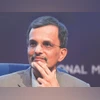Key global indicators used by the World Bank (WB) to rank the governance of countries are based on subjective opinions by expert institutions which don't know the context of member countries, Chief Economic Advisor (CEA) V Nageswaran has said.
Speaking at a seminar on Multilateral Institutions for the 21st Century by think tank ICRIER on Wednesday, Nageswaran said the Worldwide Governance Indicators has an opaque yet significant impact on the credit rating assessment deployed by the three global credit rating agencies in deciding the credit ratings of member countries, and emerging markets in particular.
"The Worldwide Governance Indicators itself is a composite of several sub-indices which are purely based on the subjective opinion of some so-called expert institutions, which do not have presence in the ground. Nor do they understand whether the context in which they are making these judgments is appropriate for the member countries," he said.
As of 2022, India had a percentile rank of 63.2 in governance effectiveness, meaning it was equal to or better than 63.2 percent of countries. Its rank has improved from 45.2 in 2014. Advanced economies such as Japan (96.2), the United Kingdom (85.8), United States (82.5), Germany (88.2) had much higher percentile ranks in 2022. Other large economies such as China (68.4), Saudi Arabia (70.8) and Russia (25.9) had scores across the spectrum.
Meanwhile, India's percentile rank in controlling corruption has improved by a smaller margin, rising from 39.9 in 2014 to 44.3 in 2022.
MDB reforms
More From This Section
The landmark report on Multilateral Development Bank (MDB) reform made a tremendous contribution in ensuring the deliverables under the Finance track of the G20, Nageswaran said. The Independent Expert Group (IEG) set up under India's G20 Presidency under former bureaucrat and Planning Commission member NK Singh and US treasury secretary Lawrence Summers had delivered 2 volumes of the report. It was acknowledged by G20 leaders in the New Delhi Leaders Declaration.
"These reports look at the roles of the multilateral development banks, their financing capacity, and effectiveness as a system, rather than looking at them as individual institutions. There is much to be gained by these banks working together," Nageswaran said.
In deference to the wishes of the shareholders, and G20 members, the report acknowledges that bigger banks are probably only second in importance to better banks, he added. Given that many of the members of the IEG were formerly associated with the World Bank and other regional MDBs, the report has delved into the internal organizational changes needed for these banks to become better, he said.
The CEA said the report has also begun to bear fruit, especially on International Monetary Fund (IMF) governance reform. Last week, the executive board of the IMF approved a proposal to make a 50 percent increase in the quota allocated to members in proportion to their current quotas. Currently, India has a quota of special drawing rights (SDR) 13,114.4 million which denotes a share of 2.75 per cent, making it the eighth-largest quota-holding country in the IMF. Based on the quota, India has 132,063 votes, which denotes a share of 2.63 per cent.
Changing course
MDB reforms are incomplete without similar reforms of the global monetary order, Niti Aayog Vice Chairman Suman Berry said. Given India's need to raise its investment rate and attract more global finance, a change in broad macroeconomic policy stance may be needed, he clarified.
"Since the Asian Financial crisis, India has run its macroeconomy essentially to make sure our current account deficit stays at around 2 percent of GDP, and we ensure the build up of reserves. This is not the ideal configuration of what India needs to achieve as we go for Viksit bharat," Berry said. He stressed that economies like South Korea were sustaining current account deficits of 5-7 percent when they were growing at their fastest. "I'm not recommending that for India, but we are in a global financial environment that discourages that kind of risk taking," he added.

)
